Three years of Aromunian statehood. How Italian fascists created Pind principality in occupied Greece
Thus, in Yugoslavia, Macedonian and Croatian nationalists actively manifested themselves, who did not agree with the actual concentration of power in the country in the hands of the Serbian Karagiorgievich dynasty and its Serbian entourage. The Croats constantly competed with the Serbs, and the Macedonians, supported by Bulgaria, argued that Macedonia should be either part of Bulgaria or an independent state, but not part of Yugoslavia with Serbian domination. Behind the backs of nationalists and separatists in many Eastern European countries were Germany or Italy, seeking to divide Eastern Europe and, in particular, the Balkan Peninsula, into spheres of influence.
Italy has traditionally had a special interest in the Adriatic coast of Yugoslavia, in Greece and Albania. In order to consolidate its influence in the region, the Italian authorities supported certain local nationalist movements. Even in Greece - almost mono-ethnic compared to the same Yugoslav state - and then the national minorities, supported by the Italian government, became more active - Albanians, Aromans and Meglen Armenians. With their help, Italy wanted to destroy Greece and establish its hegemony in the southwestern part of the Balkan Peninsula. So there were puppet states, which today almost no one remembers.
Aromuns and Meglen Romanians - nomads of the Greek mountains
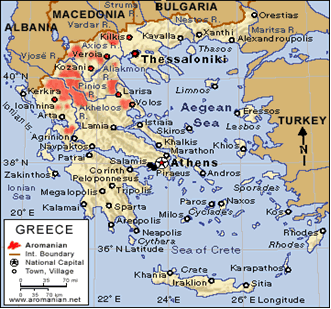 Aromunas - a small Roman-speaking people in the southern part of the Balkan Peninsula, together with related Meglenorumins (meglenites) - are linguistically close to the Romanians, but due to the specific way of life they have preserved more archaic and authentic features. Aromuns and Meglen Romanians were known in the Balkans under the name "Vlachs" (the Romanians themselves were called Vlachs). The number of Aromans and Meglen the Romanians has never been high. Currently, in the territory of Greece, Albania, Macedonia, Bulgaria and Romania, there are a total of about 300 thousands of Aromanians, in Northern Greece and Macedonia - about 20 thousands of Meglen Armenians. Historically, the Balkan "Vlachs" professed Orthodoxy, but part of the Aromoans in Albania and the Meglen Romanians in Greece during the Ottoman rule in the Balkans adopted Sunni Islam.
Aromunas - a small Roman-speaking people in the southern part of the Balkan Peninsula, together with related Meglenorumins (meglenites) - are linguistically close to the Romanians, but due to the specific way of life they have preserved more archaic and authentic features. Aromuns and Meglen Romanians were known in the Balkans under the name "Vlachs" (the Romanians themselves were called Vlachs). The number of Aromans and Meglen the Romanians has never been high. Currently, in the territory of Greece, Albania, Macedonia, Bulgaria and Romania, there are a total of about 300 thousands of Aromanians, in Northern Greece and Macedonia - about 20 thousands of Meglen Armenians. Historically, the Balkan "Vlachs" professed Orthodoxy, but part of the Aromoans in Albania and the Meglen Romanians in Greece during the Ottoman rule in the Balkans adopted Sunni Islam. Both the Aromanians and the Meglen Romanians traditionally were engaged in far away sheep farming. It is noteworthy that they actually retained the traditional occupations and methods of housekeeping that are inherent in the pre-Roman period. In fact, the Aromane and Meglen Romanians are the descendants of the Illyrian tribes of the Balkans who underwent a gradual Romanization as a result of the conquest of the region by the Roman Empire. The absence of a highly developed economy, culture and small number of people caused the minor and even third-level roles that representatives of these ethnic groups played in the Balkan political stories. The Meghlen Romanians did not know statehood at all, the Aromane in the Middle Ages had several small state formations. The most significant of them was Great Vlachia (not to be confused with Wallachia, located on the territory of modern Romania). It existed in the territory of the Greek Thessaly and Pindus in the 13th-14th centuries, arising from the weakening of Byzantium and the de-facto independence of the Vlach tribes.
In 1390's the territory of Great Vlachia was conquered by the Turks. Nevertheless, the Ottoman authorities poorly controlled the situation in the mountainous regions inhabited by nomadic and semi-nomadic Vlach tribes, as a result of which the latter maintained autonomy in internal affairs, but did not play a serious role in political life.
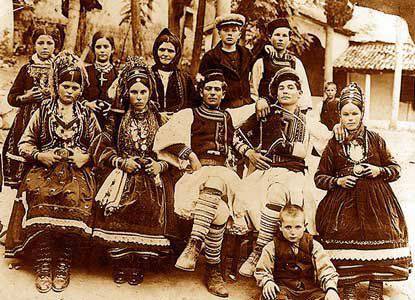 In addition to Great Vlachia in the Balkans, there were several other state entities created by the Aromans - Malaya Vlachia, Old Vlachia, Upper Vlachia, Vlachorinia. However, it is rather difficult to call them states in the full sense of the word. After the final establishment of the power of the Ottoman Empire in this region, the history of the Vlach state formations ceased for several centuries. During this time, the Vlachs absorbed many elements of the culture of neighboring peoples - not only the Greeks and Slavs of Macedonia, but also Albanians, Turks, and Gypsies.
In addition to Great Vlachia in the Balkans, there were several other state entities created by the Aromans - Malaya Vlachia, Old Vlachia, Upper Vlachia, Vlachorinia. However, it is rather difficult to call them states in the full sense of the word. After the final establishment of the power of the Ottoman Empire in this region, the history of the Vlach state formations ceased for several centuries. During this time, the Vlachs absorbed many elements of the culture of neighboring peoples - not only the Greeks and Slavs of Macedonia, but also Albanians, Turks, and Gypsies. Despite the fact that the Aromanians had an extremely undeveloped own national movement and lacked the tradition of statehood, they made a great contribution to the history of many Balkan states. We are talking about assimilated Aromans, more precisely - the Greeks, Serbs, Albanians of Aromun origin, who considered themselves more patriots of their states than expressing the interests of the Aromun ethnic group.
Mussolini put on aromana
The situation began to change in the period preceding the beginning of the Second World War. The Italian government, which viewed Greece and Yugoslavia as a sphere of its military-political interests, decided to rely on the national minority of Aromanians and Meglen Romanians, since the latter belonged to the Roman-speaking peoples and, accordingly, could be considered as linguistically and ethnically related to the Italians. The Italians established links with the Aromuna and Meglen-Romanian political circles through the mediation of the Internal Macedonian Revolutionary Organization (VMRO), which also collaborated with Italy, acting as an opponent of Yugoslavia and the Yugoslav royal government. The close ties between the VMRO and the Aromunian movement were due to the fact that the Aromanians also lived in the territory of Macedonia, there were quite close cultural ties between the Macedonian Slavs and the Aromanians. VMRO leader Ivan Mikhailov was married to the actor Melpomena Kyrnycheva (1896-1964), a terrorist who killed the Bulgarian socialist Todor Panitsa.
The Second World War in the Balkans began with the Italian invasion of Greece 28 in October 1940. His Italian duce decided to undertake independently, without recourse to Hitler, because he was offended by the latter for excessive, in the opinion of Mussolini, German activity in the Balkans - in that part Europe, which the Italians considered their sphere of influence. At 5.30 in the morning, Italian troops attacked Greece from the territory of Epirus. Benito Mussolini expected that the march-throw of the Italian army in the Balkans would be swift and bring lightning victory over a weak Greece. However, the Greeks showed a high fighting spirit and ability to fight. The Italians “got bogged down” in Greece for the whole fall of 1040, the winter of 1940-1941. In March, 1941 from Italy deployed additional military units. However, the Greeks and this time managed to repel the attack of the aggressor, after which Germany was forced to come to the aid of Italy.
An incomparably more prepared and well-armed Wehrmacht became the decisive trump card in the war of the Axis countries against Greece. Moreover, most of the Greek divisions were concentrated on the Italian front - along the border with Albania, from where the Italian forces were advancing. However, the Wehrmacht used Bulgaria as a base for an attack on the territory of Greece. The Greek command, which did not expect an invasion from Bulgaria, could not push more than six divisions against the Wehrmacht. The weakness of the defense on the Bulgarian front played a key role in the defeat of the Greek army. For quite a short time, the Germans managed to defeat not only the majority of the Greek armed forces, but also the English who came to help them. The fighting against Greece and Yugoslavia lasted for 24 days - from 6 to 29 in April 1941. The German army lost 2,5 thousand soldiers killed, 3 thousand missing and 6 thousand wounded. At the same time, 375 of thousands of soldiers and officers of the army of Yugoslavia and 225 of thousands of soldiers and officers of the army of Greece were taken prisoner. In addition, the British expeditionary corps suffered serious losses, fighting on the side of the Greeks — killed, injured and captured about 12 thousand British, Australian, New Zealand soldiers and officers.
The territory of Greece was divided into allied occupation zones. Germany took control of the most important cities of Greece - Athens, Thessaloniki and Edessa, and later - most of the island of Crete. Part of Northeastern Greece, Thrace and East Macedonia went to Bulgaria, whose territory was used by the German troops as a springboard and base for an attack on Greece. The rest of the country — its western and southern territories, including the Pind Mountains, where Aromani and Meglen Romanians lived — became part of the Italian occupation zone.
Here it is necessary to tell a little about nationalist sentiments among the Aromans and Meglen Aromans. Initially, the development of the Aromounian identity set itself the important task of weakening the Ottoman Empire, Greece and the Slavic world of Austria-Hungary. However, by the time the Austro-Hungarian leadership was seriously interested in this issue, many Aromanians were already assimilated by the Greek, Albanian, Slavic environment. During the exacerbation of relations between Romania and Greece in the period before the First World War, Romania tried to use the Aromune national minority to its advantage. However, on the whole, the Aromanians remained indifferent to these attempts of Bucharest, and only a small part of the Greek Vlachs became the agents of the Romanian policy. After the end of World War I, many pro-Romanian Aromanians emigrated to Romania. There they fell under the influence of the Romanian nationalist movements, with which they associated themselves. On the other hand, among the Aromonians who remained in Greece, there were many sincere patriots of Hellas. The last factor ultimately led to the failure of the Italians' experiment to create an Aromoan state in the Pindus Mountains.
In the Pind Mountains, an attempt was made to create a new public entity. It was assumed that under the Italian protectorate there would be the Pindo-Meglen principality. This puppet state of the Italian government tried to set as an example of the national self-determination of the Aromun and Meglen-Romanian minority in the territory of Greece. Naturally, the question arose of who would be the prince of the newly formed state of Aromans and Meglen Romanians.
Exuberant Alkiviad - the first prince of Pindus
The choice of the Italian leadership, who actually exercised real control of the Pindus territory, fell on the leader of the Aromuna nationalist organization "Roman Legion" of the Greek aristocrat of Aromun origin Alkiviades Diamandi di Samarina (1893-1948). A native of the highland village of Samarin, located at the highest point of Greece, Alcibiades Diamandi was the son of the Aromune traders. Since the family lived in prosperity, the young man, after graduating from elementary school in his native village, entered the Greek lyceum in Thessaloniki and then left for study in Romania, which served as a center of attraction for Greek Vlash (Aromunian and Meglenoruminian) youth. In Bucharest, Alkiviaad graduated from the Commercial Academy and after Romania joined the First World War on the side of the Entente, he volunteered for the active army. In the Romanian army, Alcibiades served as an officer, then was demobilized and went to Albania.
In 1918, the city of Alcibiades Diamandi was among the creators of the short-lived Republic of Korca, which was originally supposed to become the state of the Aromounian population of Albania and Greece. It was during the First World War that Alcibiades Diamandi contacted the Italians. He struck up a friendship with the activists of the fascist movement, supported the coming to power of Benito Mussolini. Relations with Rome became even stronger after the victory in Italy of the fascist party. At the same time, Diamandi closely cooperated with the Romanian government, as he was in search of patrons for the implementation of the project of the Aromuna state. Roman-speaking Italy and Romania seemed to him to be the two largest participants in the Balkan policy, able to stand up for the small Aromune minority. However, Diamandi was still not so much a nationalist and a fighter for the rights of the Aromun ethnos, but rather an adventurer and, perhaps, an agent of Italian and Romanian special services, performing relevant tasks in order to weaken Greek statehood.
Alcibiades Diamandi showed up in Greece, where he officially resided, using the status of vice president of the National Oil Company of Romania, engaged in oil supplies. At the same time, Diamandi was engaged in the supply of lumber - that is, he was a fairly successful entrepreneur. Diamandi combined commercial activities with political as well as with no less stormy private life - for example, he had a fight in one of the bars of Piraeus with the captain of the Greek naval fleet and was wounded by a broken glass from a bottle. The scar received during a fight in a cafe subsequently facilitated the work of the Greek counterintelligence in finding Diamandi.
All the time that Diamandi was in Greece was under the supervision of the Greek counterintelligence, who saw him as a Romanian intelligence agent working under the cover of a merchant aimed at inciting anti-Greek sentiments among the Aromongian population of Greece. In the end, Diamandi tried to expel from the country, but he managed to avoid deportation and stay in the territory of Greece. When the Italian-Greek war began in the fall of 1940, Diamandi offered services to the Italian General Staff and began serving as an interpreter with the Chief of General Staff, Alfredo Guzzoni.
After the first defeat and retreat of the Italian army, Diamandi also left for Albania, but in the spring of 1941, with Italian troops, he returned to Greece. On the territory of Epirus, Thessaly and parts of Macedonia, he was to head the "Autonomous State of Pindus." It was Diamandi who became the developer of the Pinda state system concept. According to Diamandi and his supporters, the Vlachs should have taken the model of the Swiss Confederation as a model - after all, the Vlachs practically did not fully know statehood and were a freedom-loving conglomerate of tribes, which should be united into cantons that make up the principality - the confederation.
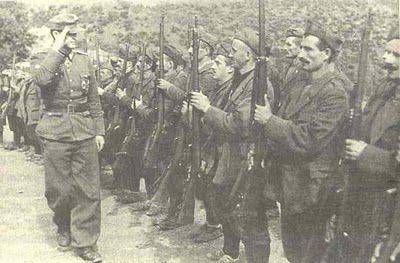 In September, 1941 commanded by the Italian division "Pinerolo", General Cesare Benelli, proposed the creation of Aromuna units in several Pinda settlements. In addition, at the suggestion of the Italian general, gendarme units were to be formed, staffed with aromans and Macedonian Bulgarians. However, the commander of the Third Army Corps did not endorse the plans of General Benelli. Subsequently, the general himself was largely disillusioned with the Aromoans, since the latter were mostly not so pro-Italian, but self-serving and sought only for their own enrichment and approval in administrative posts. In the meantime, Diamandi created the Fifth Roman Legion, formed from several hundred Aromong volunteers. A significant part of the legionnaires were ordinary mountain robbers, as well as former police informants, persons without definite occupation. In total, Diamandi managed to assemble no more than 1000 people, since the majority of Greek Aromonian military men refused to serve in the legion. The task of the Legion proclaimed the creation of an Aromunian state on the territory of Pindus, Epirus, Thessaly, Macedonia and Southern Albania. The Italians put up with the existence of the legionnaires Diamandi, since the latter acted as decisive opponents of the Greek partisan movement and provided invaluable services to Italians in conducting intelligence and fighting the partisan movement.
In September, 1941 commanded by the Italian division "Pinerolo", General Cesare Benelli, proposed the creation of Aromuna units in several Pinda settlements. In addition, at the suggestion of the Italian general, gendarme units were to be formed, staffed with aromans and Macedonian Bulgarians. However, the commander of the Third Army Corps did not endorse the plans of General Benelli. Subsequently, the general himself was largely disillusioned with the Aromoans, since the latter were mostly not so pro-Italian, but self-serving and sought only for their own enrichment and approval in administrative posts. In the meantime, Diamandi created the Fifth Roman Legion, formed from several hundred Aromong volunteers. A significant part of the legionnaires were ordinary mountain robbers, as well as former police informants, persons without definite occupation. In total, Diamandi managed to assemble no more than 1000 people, since the majority of Greek Aromonian military men refused to serve in the legion. The task of the Legion proclaimed the creation of an Aromunian state on the territory of Pindus, Epirus, Thessaly, Macedonia and Southern Albania. The Italians put up with the existence of the legionnaires Diamandi, since the latter acted as decisive opponents of the Greek partisan movement and provided invaluable services to Italians in conducting intelligence and fighting the partisan movement. Under the leadership of Diamandi, the Vlaš parliament acted, to a greater extent fulfilling decorative functions. Nevertheless, he adopted a number of laws that suggested limiting the use of the Greek language, renaming cities and villages from Greek names to Romance, and spreading the Aromunian and Italian languages. March 1 1942 of Alcibiades Diamandy issued a manifesto, which was published in the local press and signed by leading intellectuals aromunskimi - lawyer Nicola Matussi professor Dimas Tiutrasom, lawyer George Vassilakis, professor Tolley Pasta, Professor Costa Nicolescu and some other authoritative representatives of national minorities aromunskogo.
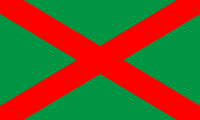 The flag of the Pindsko-Meglenskogo principality included the traditional Italian colors - red and green.
The flag of the Pindsko-Meglenskogo principality included the traditional Italian colors - red and green.Diamandi’s activity, which was supported by Italy, aroused sympathy from the leadership of Romania, where by this time the regime of Marshal Ion Antonescu was established. Diamandi was asked to make the Principality of Pindus associated with the Kingdom of Romania a state. Another option meant the transfer of the principality under the administration of the royal Savoy dynasty, which ruled in Italy. After activating the partisan movement in Greece, Diamandi was forced to flee from the Principality of Pindus to Romania. After the overthrow of the monarchy and the establishment of a communist regime, he was arrested on February 21 of 1948 and died in the prefecture of police in Bucharest in July of the same year (by all appearances, the Aromounian politician was simply beaten to death by Romanian counterintelligence).
The departure of Diamandi to Romania again puzzled the Italian leadership of the need to find a prince for the Pindus State. Temporarily, the duties of the head of this quasi-public entity were assigned to the lawyer Nikola Matussi (1898 - after 1981). An activist of the Aromun nationalist movement, Matussi was a countryman of Alkibiades Diamandi in the village of Samarin in the Pindus mountains. For a while, from 1923 to 1926, he led the Communist Party, but was then expelled. Then Matoussi joined Diamandi's “Roman Legion” and was appointed Prime Minister of the Pindo-Meglen principality. In June, 1942, after the abdication of Diamandi from the throne, Matussi became the regent of the state, but in 1943, he was also forced to leave the post and flee to Romania. After the overthrow of the monarchy, Nikola Matussi, as an accomplice of the fascists, was sentenced to long imprisonment in communist Romania and spent twenty years in prison. Only in 1964, he returned to Greece, where he was found innocent of war crimes and later lived in Athens.
Descendant of pechenegs
At the post of ruler of the Pindsko-Meglenskogo principality, Matussi was replaced by a new protégé of the Italians - Count Gyula Istvan Chesneki di Milvan (1914 - after 1970). As is clear from the characteristic names and surnames, Gyula Chesneki di Milvan was a Hungarian by nationality or, more precisely, a Hungarian aristocrat of Pechenegian origin, since he built his kind precisely to the ancient Pechenegs, who once wandered in the Hungarian nation. The sympathy of the Italian command Gyula Chesneki di Milvan deserved a great contribution to the food supply of the Italian troops deployed in Greece and Yugoslavia - he supplied the Italian units with bread.
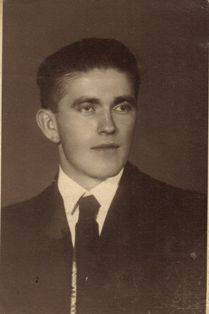 Gyula was born in the family of a Hungarian aristocrat Ferenc Chesneka and the daughter of grain merchant Maria Khanjak, but after the end of the First World War the Chesneka family suffered serious losses, as much of their property was nationalized by the Serbian authorities. Gyula went to serve in the Hungarian army, he studied at a military school in Italy, where he became interested in fascist ideology and aesthetics. The young aristocrat was no stranger to poetry and translated into Hungarian Gabriele d'Annunzio. In 1940, the city of Gyula participated in the annexation of Northern Transylvania to Hungary, for which he received from the Hungarian dictator admiral Miklos Horthy a medal. Then, for some time, the count was a member of the Privy Council under the formal monarch of Croatia, King Tomislav II, but left him because of disagreement with the leadership of the Ustasha. In August, 1943, under the name of Julius I, Count Gyula Chesneki di Milvan was proclaimed the Great Commander of Macedonia and the Regent of the Pindus-Meglen Principality. The count was supported by the Italian government of Badoglio, who collaborated with him on the evacuation of the Italian troops from the Balkan Peninsula.
Gyula was born in the family of a Hungarian aristocrat Ferenc Chesneka and the daughter of grain merchant Maria Khanjak, but after the end of the First World War the Chesneka family suffered serious losses, as much of their property was nationalized by the Serbian authorities. Gyula went to serve in the Hungarian army, he studied at a military school in Italy, where he became interested in fascist ideology and aesthetics. The young aristocrat was no stranger to poetry and translated into Hungarian Gabriele d'Annunzio. In 1940, the city of Gyula participated in the annexation of Northern Transylvania to Hungary, for which he received from the Hungarian dictator admiral Miklos Horthy a medal. Then, for some time, the count was a member of the Privy Council under the formal monarch of Croatia, King Tomislav II, but left him because of disagreement with the leadership of the Ustasha. In August, 1943, under the name of Julius I, Count Gyula Chesneki di Milvan was proclaimed the Great Commander of Macedonia and the Regent of the Pindus-Meglen Principality. The count was supported by the Italian government of Badoglio, who collaborated with him on the evacuation of the Italian troops from the Balkan Peninsula. In September 1943, Prince Julius was removed from his post and arrested by the Hitlerite Gestapo. The reason for the arrest was not only the cooperation of Gyula Chesneki with the new anti-fascist authorities of Italy, but also the internal policy that the prince tried to pursue on the territory of his possessions, which was doubtful from the point of view of Hitler's national socialism. Gyula’s political views were not typical of the Eastern European far right in those years. Firstly, he argued that the Meglenoruminsky and Aromunsky population of the Principality of Pindus are not Romanians, but descendants of nomads - the Pechenegs, in accordance with which he, as a representative of the Hungarian aristocratic family of Pecheneg origin, has every reason to rule in the principality. By the way, the Pechenegs really played a significant role in the ethnogenesis of the peoples of Eastern Europe and the Balkan Peninsula, it is likely that they could also form part of the pastoralists - Aromans and Meglen Armenians in the mountains of Greece, Albania and Macedonia.
Secondly, Gyula Chesneki, like many other Hungarian politicians, was not distinguished by the anti-Semitism inherent in German or Croatian leaders. Moreover, Gyula's sister was married to a Jew, and he personally was able to save the life of a group of Hungarian and Croatian Jews, for which later merits were recognized by the Israeli government. Therefore, the Gestapo had every reason to arrest the suspicious Hungarian aristocrat and the Aromong monarch, but soon, thanks to the support of General Gleise von Horstenau, Gyula was released from prison. He emigrated from Hungary and after the war he lived in Argentina, and then in Brazil.
After Count Gyula was deposed, for some time the power in the principality formally belonged to his brother Mihai, but the latter did not appear on the territory of its possession. Then the German command, which by this time replaced the Italians in the Balkans and pursued a fairly tough policy, put at the head of the Pindus-Meglen principality its protege M. Haci, who was no longer occupying the princely throne, but was simply called the military governor. However, the rule of Khatsi also was not long. Greek partisans stepped up their actions against the German troops occupying the territory of Pindus. The Minister of Defense of the Pindo-Meglen principality Vasil Raputika, who offered his services to the Germans, was captured by the Greek partisans and killed, and the corpse of Raputica, tied to the back of an ass, was taken by the Greeks through the Aromuna villages of Pinda, wishing to demonstrate to the Aromuna people that the principality had come to an end and the unity of Greece was restored.
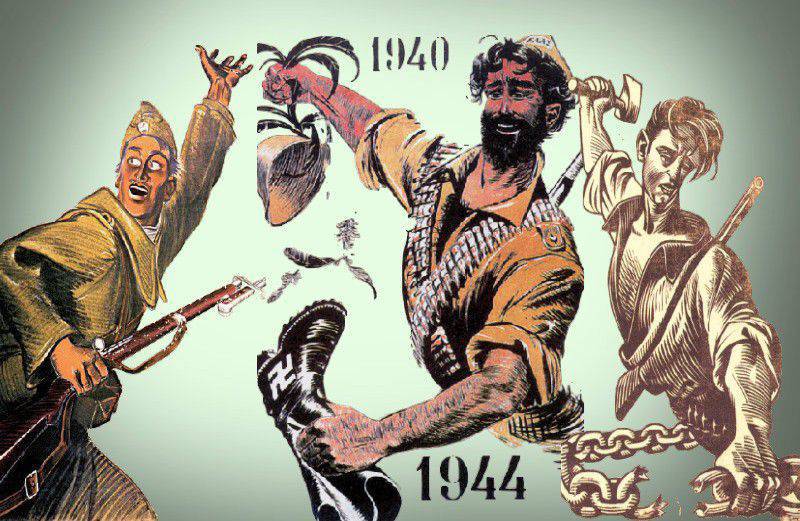
After the liberation of Greece by partisans and allied forces, the Pindo-Meglen principality ceased to exist, remaining in history as an exotic example of the creation of its own state of Aromanians and Meglen Romanians. Today, Aromani and Meglen Romanians are a national minority in a number of Balkan states, and their gradual assimilation into the titular nations of Greece, Albania, Macedonia, Bulgaria and Romania forces the European Union to allocate funds to support the language and national culture of the Aromunian and Meglen Romanian population of the Balkans.
Failure of Aromun landing
However, the liberation of Greece from the Nazi occupation did not mean the final refusal of the Nazis from ambitions in the Balkans. Although the end of Nazi Germany was not far off, the German intelligence services sought to continue the fighting in the Balkans. In February, 1945 attempted to land paratroopers in Greece in order to exploit the intra-Greek crisis in the interests of Germany. The detachment that landed in Greece was formed from among the Aromanians - Greek citizens who migrated from Greece to Romania even after the end of the First World War.
Many of the Aromanians participated on the territory of Romania in the activities of the Iron Guard and some other right-wing organizations. The Nazis recruited their agents from among the former iron guards, which was prepared in special camps in Germany. Among the Iron Guards who found themselves in Germany, there were also Aromunian natives from Greece. The Nazis trusted them because they knew the fanaticism of the Iron Guards, on the other hand, the Greek citizenship and knowledge of the Greek language made the Aromune volunteers the most suitable contingent to enter the Greek territory as scout saboteurs.
In December, 1944 in Guntramsdorf, near Vienna, began the formation of a special detachment of Greek-speaking Aromanians. Three volunteers were sent to Guntramsdorf, where they joined the 11 Aromanians, who had retreated from Greece along with German troops. Among the retreating Aromonians were members of the "Roman Legion", created at the time by Alcibiades Diamandi. 14 fighters of the special squad trained under the leadership of Chief Lieutenant Prince and Lieutenant Lorre, mastering the possession of all types of rifle weapons, disguise and sabotage methods, mining. Two volunteers were sent to Murau for training courses for wireless operators. The entire detachment passed the course of airborne training.
It was originally planned to throw a diversionary detachment by parachute into Greece on the night from 30 to 31 in January of 1945, but the flight was canceled due to bad weather. However, 13 February squad was assembled to prepare for departure. The detachment was given two radio transmitters, two light machine guns, two automatic pistols, explosives, detonators, and fuses. The saboteurs themselves were dressed in civilian clothes, each of them got a revolver. The detachment was given the task of informing the German command about the political situation in Greece, propaganda and misinformation among the Greek population. At a later stage, the saboteurs were to go to the undermining of roads and bridges. It is noteworthy that no conditions for the evacuation of saboteurs were discussed - apparently, the Aromun volunteers were poorly informed about the real situation of the German troops on the western and eastern fronts and expected that the Wehrmacht would return to Greece soon.
At 3 o'clock in the morning 14 February 1945, the landing force was dropped on the territory of Greece. A group of seven people could not get in touch with other skydivers. February 17 in Diakopton two saboteurs aroused suspicion that they could not find Greek money to pay the bill in a cafe and tried to pay in dollars. The scouts were detained by the Greek counterintelligence and gave out the whereabouts of the other five saboteurs. Later several more saboteurs were captured. Their interrogations were carried out by officers of the British army stationed in Greece. It is likely that the saboteurs caught were far from being the only detachment that had been sent by the German command to Greece, but it is not known about other examples of such landing of reconnaissance and sabotage groups consisting of representatives of the Aromunian population.
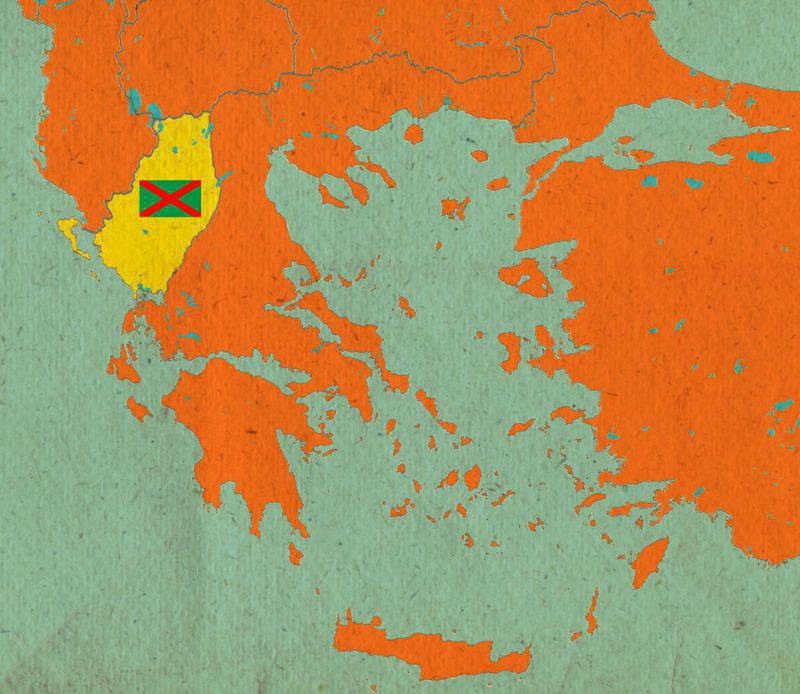
Information